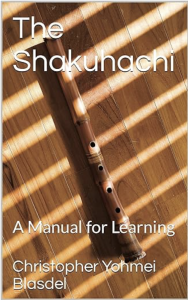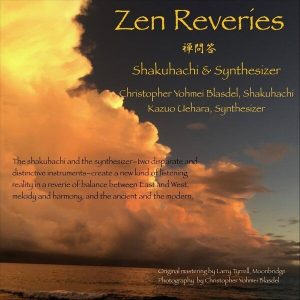Posts By yohmei
The Shakuhachi: A Manual for Learning now available on Amazon Kindle
 The e-book version of The Shakuhachi, A Manual for Learning, one of the first comprehensive English-language shakuhachi instruction books, is now available on Amazon Kindle at the significantly reduced price of $9.99. Originally published in 1986 by Ongaku no Tomo-sha, Japan’s leading music press, The Shakuhachi has undergone numerous editions and helped many beginner and intermediate players learn more about the instrument and how to play it. This book covers all the basic aspects of learning the shakuhachi, beginning with a chapter on bamboo and shakuhachi making, how to handle the instrument, tone production, as well as basic fingering and Kinko style ornamentation techniques. Also included in the book are a series of graduated shakuhachi practice exercises, from simple tunes to some of the lofty classical sankyoku pieces. These exercises, along with recorded examples, are also available for free download.
The e-book version of The Shakuhachi, A Manual for Learning, one of the first comprehensive English-language shakuhachi instruction books, is now available on Amazon Kindle at the significantly reduced price of $9.99. Originally published in 1986 by Ongaku no Tomo-sha, Japan’s leading music press, The Shakuhachi has undergone numerous editions and helped many beginner and intermediate players learn more about the instrument and how to play it. This book covers all the basic aspects of learning the shakuhachi, beginning with a chapter on bamboo and shakuhachi making, how to handle the instrument, tone production, as well as basic fingering and Kinko style ornamentation techniques. Also included in the book are a series of graduated shakuhachi practice exercises, from simple tunes to some of the lofty classical sankyoku pieces. These exercises, along with recorded examples, are also available for free download.
You can view the Amazon site here.
古いCDの新しいリリース
みなさま、
この度、私は80・90年代に録音・リリースした二つのアルバムをApple, Amazon, Spotify, I-tunesなどのストリーミング・サービスでの再リリースをお知らせいたします。
 迦楼羅の夜 (Night of the Garuda) は若き自分の初アルバムでしたが、収録に当たって素晴らしい共演者に恵まれました。収録曲は、以下の通りです(再版にあたって、同じ頃レコーディングした別のアルバムに収録した一曲も加えました。)
迦楼羅の夜 (Night of the Garuda) は若き自分の初アルバムでしたが、収録に当たって素晴らしい共演者に恵まれました。収録曲は、以下の通りです(再版にあたって、同じ頃レコーディングした別のアルバムに収録した一曲も加えました。)
1.「迦楼羅の夜」尺八+龍笛(芝 祐靖)
2.「月」尺八と笙のために二重奏(宮田まゆみ)、作曲:増本伎共子
3.「アチットランの歌」尺八+声(きむら みか)
4.「一二三鉢返し」琴古流尺八本曲
5.「ままの川」尺八+歌/三絃(平井澄子)
6.「薔薇の影で」尺八+ウード(ハムザ・エル・ディン)—旧・<遙なる笛>収録—
このアルバムには、今は他界された師たちの名演奏も収められています。あらためて彼らの音に触れたく、<迦楼羅の夜>をアップロードすることにしました。以下のサイトにアクセスされて下さい。——よろしくお願いいたします。
christopheryohmeiblasdel.hearnow.com
 禅問答 (Zen Reveries)―尺八とシンセサイザー。このアルバムは1996年Moonbridgeというインディーラベルより発売されました。矛盾すると思える2つの楽器、尺八とシンセサイザーが、新しい真実の世界を創造しています。それは東洋と西洋、メロディーとハーモニー、そして古代と現代が調和するまさに幻想の世界と言えましょう。シンセサイザー奏者は日本電子音楽世界の先駆者の一人、上原和夫です。
禅問答 (Zen Reveries)―尺八とシンセサイザー。このアルバムは1996年Moonbridgeというインディーラベルより発売されました。矛盾すると思える2つの楽器、尺八とシンセサイザーが、新しい真実の世界を創造しています。それは東洋と西洋、メロディーとハーモニー、そして古代と現代が調和するまさに幻想の世界と言えましょう。シンセサイザー奏者は日本電子音楽世界の先駆者の一人、上原和夫です。
以下のサイトにアクセスされて下さい。——よろしくお願いいたします。
これらの古い録音を今再び世に出せてとても嬉しく思います。若かった当時の僕は、ワクワクしながらこれらのCDを制作したものですが、今でもその気持ちは忘れていません。
My vintage CDs uploaded to CD Baby Pro
 The Night of the Garuda (1986) features such stellar musicians as master ryūteki (gagaku flute) performer Shiba Sukeyasu, shō player Miyata Mayumi, vocalist Kimula Mika, legendary shamisen player the Hirai Sumiko and the oud master Hamsa el Din. The tracks consist of:
The Night of the Garuda (1986) features such stellar musicians as master ryūteki (gagaku flute) performer Shiba Sukeyasu, shō player Miyata Mayumi, vocalist Kimula Mika, legendary shamisen player the Hirai Sumiko and the oud master Hamsa el Din. The tracks consist of:⦿ Night of the Garuda—improvisation with shakuhachi and ryūteki.
⦿ Tsuki, for shakuhachi and shō (composed by Massumoto Kikuko)
Song of Atitlan–for shakuhachi and voice.
⦿ Hifumi Hachigaeshi–Kinko-ryū shakuhachi honkyoku.
⦿ Mama no Kawa–Jiuta: song, shamisen and shakuhachi.
⦿ In the Shadow of the Rose—Improvisation for shakuhachi and oud (this piece originally appeared on the CD Voices from Afar, Voices from Within).
The list of accompanists includes some of the most amazing musicians active in Japan at the time. Some are no longer with us, so I take this opportunity to share their music once more. Check out the following site for purchasing or sample listening.
 Zen Reveries (1996), a collaboration between shakuhachi and synthesizer, was originally produced by Moonbridge, a small indie label, and was one of the first such collaborations between these two totally different instruments. The synthesizer is performed by the Japanese electronic music pioneer Uehara Kazuo, and through his delicate harmonies and melodies the insistent voice of the shakuhachi weaves in an out, responding to the vast array of warm, complex timbres created by the synthesizer. The result is the best of both the electronic and the acoustic. Please check it out on the following website:
Zen Reveries (1996), a collaboration between shakuhachi and synthesizer, was originally produced by Moonbridge, a small indie label, and was one of the first such collaborations between these two totally different instruments. The synthesizer is performed by the Japanese electronic music pioneer Uehara Kazuo, and through his delicate harmonies and melodies the insistent voice of the shakuhachi weaves in an out, responding to the vast array of warm, complex timbres created by the synthesizer. The result is the best of both the electronic and the acoustic. Please check it out on the following website:
新刊のお知らせを申し上げます。
- はじめに
- 耳に掃除
- 周りの風景を「耳」で体験する
- 初めて出会った新鮮な日本街並みの音
- 耳で旅するー「音」は文化の真髄
- 邦楽との出会いー命のささやきのように聞こえた尺八
- 5つの穴から多くの<「音色」
- わずか3本の絃で微妙な音がー三味線の「触り」が命
- 無駄を省いた表現を生む日本音楽の原点
- 人間は大自然の音によって組み立てられた「歌」である


